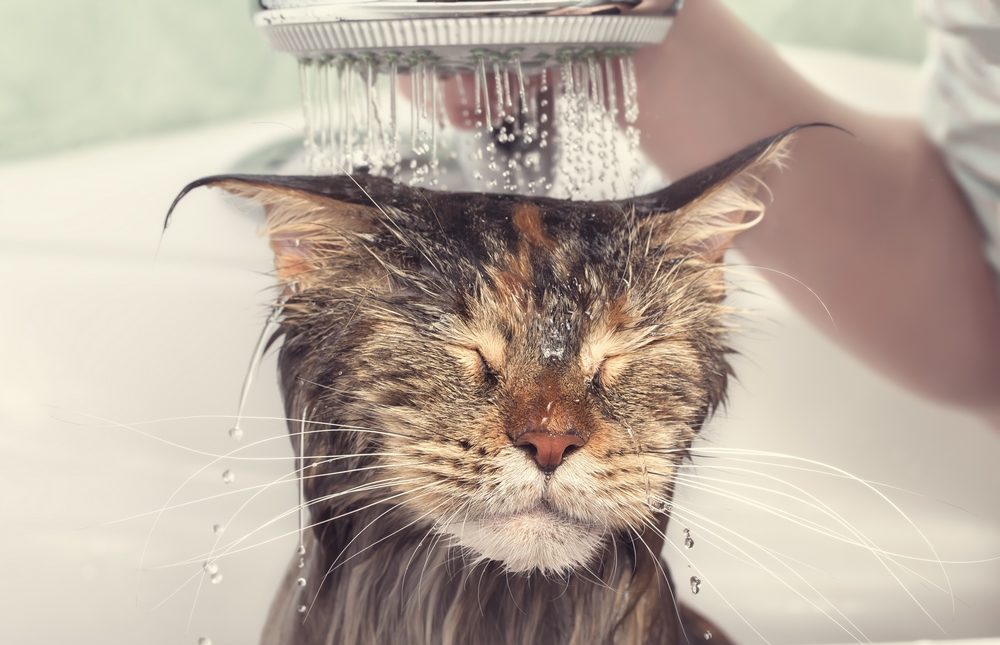
How often can you wash a cat or kitten: the frequency of the procedure, recommendations and tips
Some cat owners are sure that this pet does not need to be washed. She can wash herself and lick herself, and bathing only harms her. Other owners are firmly convinced that this animal also periodically needs to take water procedures and this is good for them. Then another question arises: how often can cats be bathed? And if you wash the cat, then with what shampoo?
Contents
Why should you wash your cat?
Many people know that a cat can lick itself. His saliva not only contains active ingredients, but also has an acidity that dissolves any contamination. The tongue of cats is rough due to the large number of small and sharp protrusions, papillae. These animals lick themselves instinctively and, if the cat is healthy, it always keeps itself clean.
However, dirty basements, rubbish, a lot of germs, exhaust gases lead to the need to wash the cat so that he does not become infected with something. If you do not let the cat outside, it still does not solve the problem. Harmful bacteria enter the apartment along with human clothes, but such completely domestic cats should be washed less often than walking ones.
How often can cats be washed?
Cats that are not allowed outside are bathed every three months, the owner must also comb it periodically. If the owner lives in the city, then a pet that walks every day in the yard should be washed every one and a half to two months. An animal that lives in the village and walks along the village streets is washed three to five times a year. Hairless cats should be bathed more often – in the summer every two weeks, in the winter once a month.
You must adhere to the following recommendations:
- many owners do not know at what age to bathe a kitten. Of course, early water training will allow you to bathe an adult cat without any problems in the future. But you should know that tiny kittens are badly affected by temperature changes. It is better that in the first months the mother cat takes care of their cleanliness. After the loss of milk teeth (4 months), you can wash the kitten for the first time;
- how often to bathe a kitten? It depends on his reaction to the first bath. It is good if he is not afraid of water and will jump into the bathroom with pleasure. If a kitten plays with water, do not scold him. But still, most animals do not like water procedures, so the kitten should then be bathed after changing milk teeth;
- adult cats need to be washed 2-3 times a year. The number of baths depends on the breed. Persians, especially pure white and peach ones, can be washed every 2-3 months. Absolutely do not need water procedures breeds such as British “plush” and European cats. The Sphinx is only wiped with a wet cloth;
- cats should not be bathed if the room is very cold. A wet animal can easily get sick. It is undesirable to wash animals during illness, after vaccinations, so as not to expose weakened immunity to even more stress;
- a pregnant or lactating cat is washed in case of emergency, so as not to create a stressful situation.
When should a cat be washed?
There are several reasons for bathing cats. Let’s consider each of them in more detail.
The appearance of a kitten in the house
If the kitten was adopted from a shelter or from a domestic cat, then it is completely optional to wash it, because in these cases it must be clean. If a kitten was picked up on the street, it is necessary to bathe it. In this case, it is necessary, in order to prevent, to use special shampoos. This will not only make it clean, but also helps identify possible skin problemsthat need to be cured.
Not all cats are absolute cleanliness. Some can only lick the sides or wipe your head with a paw, leaving untouched places such as:
- tail;
- the pop
- ears.
Therefore, the owners themselves finish what they started, having thoroughly bathed the cat.
Also, walking cats can get dirty in dirt, dust, bring burdocks and cobwebs home on wool. To prevent all this goodness from being on upholstered furniture or a bed, the animal must be bathed. Even indoor cats that never go outside can get dirty by overturning a pot of earth, carelessly urinating, and so on.
Animal moult
Many breeds are bred artificially, so the owners should take special care of them. Animals are bathed in order to soften the skin and coat, which dry out very much in a heated room.
Also during molting only bathing can remove falling hairsotherwise the new wool will grow very poorly. With the help of water procedures, the molting process is accelerated and facilitated.
Presence of parasites
If your cat has fleas, you can wash it with flea shampoo. Some of them do not cope with this task and, in order not to wash their pet often because of this, stronger means can be used in the form of drops or sprays. They are applied to the animal’s coat and washed off after two days.
There are also tar veterinary shampoos that treat skin diseases in animals. It should only be used as directed by a doctor.
Preparing for the exhibition
Elite thoroughbred cats require appropriate care. Before various exhibitions they are washed with special shampoosthat adds shine to the coat and increases its volume. These shampoos are very expensive, but the hair looks great.
This is why animals are bathed. But don’t get too carried away with it. Many owners specifically wash their pets in order to make fun of their pitiful wet appearance later. Such negligent pet owners should know that they lack sweat glands, and the amount of secretion that is secreted by the sebaceous glands protects against dryness. If you bathe your cat too often, the water begins to wash away the secret, and the skin dries out. It becomes covered with cracks, peels off, the hair begins to fall out.
What is the best shampoo to wash a cat?
For bathing cats, you can not use human shampoo, even children’s. For these animals, special shampoos have been developed that have a special composition that can be used for sensitive skin.
- Liquid shampoo contains natural ingredients that care for the coat.
- Dry shampoo is similar to baby powder, which is applied to the animal’s coat, and then combed out along with the dirt. It is used in the case when the cat categorically does not want to climb into the water.
If you follow all the recommendations and do not allow too frequent bathing of the animal, then the pet will always be clean and healthy.





